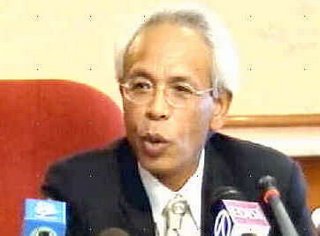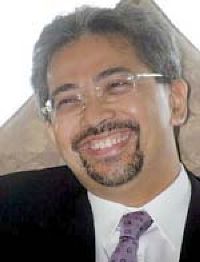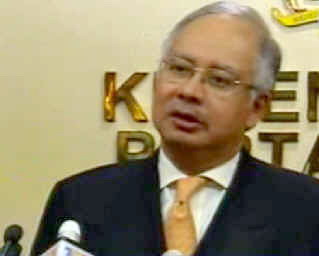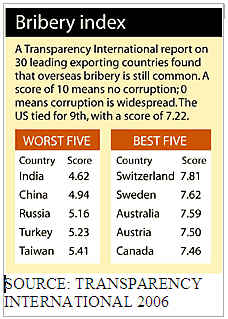PM ABDULLAH-CNN TALK ASIA Replies MAHATHIR's ALLEGATIONS in Bloomberg Interview; NO Political Suicide in ABORTING Dr M Projects; PROTON DOOMED if...
After 3 weeks of Ramandan fasting, Mahathir is renewing his criticism of PM Abdullah government in an interview he gave at Putra Jaya with Bloomberg..
In the interview, Dr Mahathir, 81, said that Datuk Seri Abdullah should increase spending on technology-related economic activities rather than concentrating on agriculture or signing trade accords with countries like
Dr Mahathir also expressed doubts his so-called Vision 2020 could be achieved and called on Abdullah to raise spending on technology complaining of neglect of MSC (Multi Media Super corridor).'
Dr Mahathir also warned that national car maker Proton will collapse unless it finds an international partner, and criticized a free trade pact between
'If you import a car, how many container loads of vegetables are you going to export to
Dr Mahathir’s final parting shot said. 'I don't want to enter politics.'
= = = = =
PM Dismisses "Political Suicide" By Reversing Dr M's Decisions;
Admitting that Dr Mahathir is still being held in the highest regard by many people after 22 years leading the country, the prime minister said he too commanded majority support. "No, no, no, I don't think it's a political suicide. He has been saying a lot of things; I've decided to keep quiet and to go on doing what I want to do.
"And the people want me to do what I want to do.
 Hosted by Anjali Rao in the "Talk
Hosted by Anjali Rao in the "Talk
And I have and I still command majority support today," he said in an interview with Anjali Rao in the "Talk
Abdullah also pointed out that not everybody appreciated it when Dr Mahathir began his criticism. He, however, said despite his silence, he did not ignore Dr Mahathir's criticisms and have made necessary adjustments if the criticisms were relevant."
And some I can't accept," he said when asked by Anjali if he ignored Dr Mahathir's criticism of him. The prime minister also dismissed a suggestion that he was rolling back everything Dr Mahathir had put in place by calling off some mega projects namely a new bridge linking Malaysia and Singapore. "Not everything he put in place. No. Vision 2020, his biggest achievement, that's my target too. That we share, I share the vision. I have developed what I call a national mission. The mission is very big in order to achieve that vision," he said.
Abdullah said he believed there were other things the Government could do to develop this country. "We are very practical about our approach and the bridge has nothing to do with the life and death of
On
"Yes, it's groundless. And it is an issue that can cause unhappiness to many people. Why? Some may even regard it as tantamount to interfering with what we are doing. "The Chinese in
= = = = = = =
Mahathir Says Abdullah Is Endangering Malaysian Economic Growth
By Angus Whitley and Haslinda Amin
Oct. 12 (Bloomberg) -- Malaysian Prime Minister Abdullah Ahmad Badawi, three years in office this month, is jeopardizing economic growth and confidence in his administration is waning, said former leader Mahathir Mohamad.
Abdullah should increase spending on technology rather than boosting agricultural production or signing questionable trade accords, Mahathir, 80, said in an interview. The medical doctor, who led the nation for 22 years until 2003, said he's being sidelined in the media and in
``I don't see any new projects coming in which would boost the economy,'' the former premier said in his office in Putrajaya, south of the capital,
Mahathir, who transformed
``The fundamental problem with Dr. M. is he feels that what he has done has a right to be continued perpetually,'' said Abdul Razak Baginda, executive director of the Malaysian Strategic Research Centre. ``That's a fallacy for any leader. The current prime minister has a different philosophy. He's concerned with a more balanced development.''
Azhar Osman, Abdullah's press secretary, said by phone that the prime minister wouldn't respond to any comments made by Mahathir in the Oct. 9 interview.
Vision 2020
In 1991, Mahathir laid out a 30-year plan known as Vision 2020 that aimed to win
Abdullah announced in March that he plans to increase public development spending 18 percent to 200 billion ringgit ($54 billion) from 2006 to 2010 compared with the previous five years. He allocated a fifth of total spending to education and training, and plans to raise palm-oil output 31 percent by 2010. Asked if he was optimistic of meeting Vision 2020's objective, Mahathir said, ``right now, I am not.'' He declined to say whether he regretted picking Abdullah as leader.
`Within Reach'
Deputy Finance Minister II Awang Adek Hussin said in an interview today the goal of becoming a developed nation by 2020 ``is still within reach,'' and that the government is committed to achieving the target.
The economy of
Muzzled
The former premier said the government prevents his views appearing in local newspapers, while the movements of members of the ruling United Malays National Organization are engineered to avoid coinciding with those of the former prime minister.
``He doesn't allow me to even meet party members,'' Mahathir said. ``He says he's my friend. On the other hand, he muzzles me.''
Mahathir was defeated in a September ballot to select speakers for the November meeting of UMNO, as the party is called. Members were bribed to vote against him, he said.
Government Failures
Mahathir in June said the government's failures included scrapping construction of a bridge to
``The current government is making an honest and brave effort to put
Taking Risks
Mahathir in the interview urged Abdullah to raise spending on technology, saying the search for tenants at his brainchild, the Multimedia Super Corridor at Cyberjaya, had been neglected. ``It's not being sufficiently promoted,'' he said. ``There are a lot of companies which would like to come.''
The government must be willing to lose money on some information technology investments in return for the chance to profit from a few successful bets, Mahathir said.
``If out of 10 or 20 projects you succeed in one, that is a good result, Mahathir said. ``Unfortunately, we are not really able to understand that we have to take risks.''
Mahathir also criticized an agreement between
`
Mahathir has a history of verbal volleys. On
Attacks on the administration don't signal a desire to return to power. Mahathir ruled out following former Singapore Prime Minister Lee Kuan Yew, who now holds the position of Minister Mentor in the city-state's cabinet.
``I would never do it,'' Mahathir said in the interview. ``I don't want to enter politics.''
Mahathir spends three days a week as honorary president of the Perdana Leadership Foundation, formed in 2003 to promote the ideas of
Last Updated:
= = = = = =
Proton Will Collapse Without a Foreign Partner, Mahathir Says
By Soraya Permatasari and Haslinda Amin
Oct. 12 (Bloomberg) -- Proton Holdings Bhd., Malaysia's biggest carmaker, will collapse unless it finds an international partner such as Volkswagen AG, said former premier Mahathir Mohamad, who set up the company more than two decades ago.
``At the rate it is going, it's not going to last long,'' said Mahathir, 80, who became an adviser to the Shah Alam, Malaysia-based automaker after stepping down as prime minister in 2003. ``Proton is reporting losses all the time, and they still have a lot of cars which they cannot sell.''
Proton has been losing market share to overseas rivals including Toyota Motor Corp., and needs to gain new technology and designs to compete. Volkswagen ended talks with the Malaysian carmaker in January because the two sides couldn't agree on issues including control of thep company.
``The government may need to offer a bigger stake or give up management control,'' said Raymond Tang, who manages $1.7 billion as chief investment officer of CIMB-Principal Asset Management Bhd. in
Proton's Chairman Mohammed Azlan Hashim and Managing Director Zainal Abidin Syed Mohd Tahir weren't immediately available for comment, the company's head of corporate communications, Faridah Idris, said by telephone today.
Proton, which produces eight car designs under its brand and two types of Lotus sports cars, has been seeking a foreign partner since Mitsubishi Motors Corp. and Mitsubishi Corp. ended more than two decades of investment in the company in January 2005.
Volkswagen
Proton and state-owned investment agency Khazanah Nasional Bhd., which owns 43 percent of the automaker, are studying whether a foreign investor could revive its fortunes,
Selling a majority stake isn't ``absolutely necessary,'' Mahathir said in the interview. Volkswagen, based in
``I still think Volkswagen is willing'' to talk, he said. ``Despite my initial intervention,'' Proton ``seems to be not keen at all to have anything to do with Volkswagen.''
Proton is also in talks to make cars with China's Jinhua Youngman Automobile Group Co. and Chery Automobile Co., as well as
``We were working with Volkswagen and we had nearly completed'' the negotiations, Mahathir said. ``We would be manufacturing Volkswagen cars here and also using Volkswagen technology here. But the new management wants to work with
Tariff Protection
The Malaysian carmaker's competitiveness has been eroded by the government's new auto policy, introduced in March, which made it cheaper to import cars into
``Proton cannot survive'' without protection, he said. ``When you go to
The company's share of
Honda,
Proton's loss widened to 58.6 million ringgit ($16 million) in the first quarter ended June 30, from 12.4 million ringgit a year earlier as a lack of new models damped sales, the company said in August. Revenue fell 31 percent to 1.42 billion ringgit.
``Proton needs a strong partner,'' said CIMB-Principal Asset's Tang. ``The best partners could be something like Honda or
Proton last month signed an initial agreement with PSA Peugeot Citroen to study the possibility of developing new models together. The agreement is Proton's third this year with an overseas carmaker for possible joint product development.
``If you merely make an arrangement in order to get the platforms from some company, that is not a transfer of technology,'' Mahathir said, referring to the Peugeot accord. If ``that's what they intend to do now, that's not going to do any good for Proton.''
New Models
Proton is also developing a new model using Mitsubishi Motors' components and technology, which it plans to start selling early next year. The Malaysian carmaker, which last year posted its lowest profit since 1991, aims to introduce six models, including its first multi-purpose vehicle, this year through 2008 to reverse slumping sales.
Auto sales in Malaysia are set to decline for the first time in three years as falling prices of used cars, stricter lending rules, higher interest rates and an increase in fuel prices curb demand, the Malaysian Automotive Association said in July.
The reduction in import taxes earlier this year pushed down prices of new and used cars.
``The problem is the government insisted that the price of cars should be lowered, which is fine for the buying party but what they didn't realize is that they lowered the price so much that they lost money,'' Mahathir said. ``Proton certainly lost a lot of money.''
Last Updated:
UPDATE: Oct 14 06
Meanwhile the Government today has thrown a “life line” to Proton by having a special allocation of RM79.5 to purchase 2000 patrol cars for the police
Extract from Bernama,
 An elaborate ceremony was conducted by Proton Edar Sdn Bhd in the handing over ceremony
An elaborate ceremony was conducted by Proton Edar Sdn Bhd in the handing over ceremony
On the delivery of the Proton Waja patrol cars, Musa said 500 patrol cars were handed over by Proton Edar today while another 1,500 would be delivered by the end of the year.Musa added that of the 500 patrol cars, 300 would be deployed in the
 And here are the Proton Waja Cars for the Police to patrol in. Was there any discount in such a big order?
And here are the Proton Waja Cars for the Police to patrol in. Was there any discount in such a big order?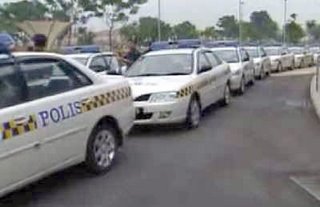
The patrol cars were bought through the RM79.5 million special allocation provided by the government and will be distributed to all police contingents in the States and districts. With the additional 2,000 patrol cars, the police now has a fleet of 3,939 patrol cars in all.
Dr Mahathir will have another say in
 Now read on in the latest post, Oct 17 06
Now read on in the latest post, Oct 17 06Upon his return from performing the umrah, Abdullah warns all quarters (Malays & Non-Malays) to refrain from CAUSING Trouble; And Information Minister Datuk Zainuddin Maidin ATTACKED Gerakan Dr Lim Keng Yaik for Insinuations & Accusations on Transparency, fanning the flame and making it worse (with the little help from Kuan Yew). Advice from Tun MUSA HITAM; Stop PUBLIC Debate








